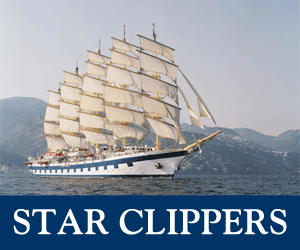
Cruising Club of America Names 2017 Award Recipients
Webb Chiles, Rich Wilson and Jessica Watson Among Winners
Webb Chiles (Hilton Head, S.C.), Rich Wilson (Boston, Mass.) and Jessica Watson (Buderim, Queensland, Australia) are among Cruising Club of America’s (CCA) 2017 award recipients selected for outstanding contributions to the sport of sailing and the history of yachting. The CCA, which co-organizes the biennial Newport to Bermuda Race and was founded nearly 100 years ago, is a prestigious invitation-only organization whose approximately 1,300 members are qualified by their experience in offshore passage making. The awards will be presented at the organization’s annual Awards Dinner in New York on March 2, 2018.
Selected by CCA for the Club’s prestigious Blue Water Medal is Webb Chiles, for his “meritorious example of seamanship” over five decades. In that time he has circumnavigated the world five times, and he has sailed 24,000 miles counting toward a sixth.

Webb Chiles

Rich Wilson

Jessica Watson
Have been awarded, respectively, CCA’s 2017 Blue Water Medal, Special Recognition Award and Young Voyager Award. Photos supplied by CCA
Selected by CCA for the Club’s prestigious Blue Water Medal is Webb Chiles, for his “meritorious example of seamanship” over five decades. In that time he has circumnavigated the world five times, and he has sailed 24,000 miles counting toward a sixth.
“A sailor is an artist whose medium is the wind,” said Chiles, who grew up far from the ocean in a non-sailing family. Fortunately, he was an avid reader, and the likes of Slocum and Conrad lead him to purchase, at age 25, his first boat, an Excaliber 26. Less than ten years later he made his first circumnavigation in an engineless Ericson 37, with only two stops, becoming the first American to sail alone around Cape Horn and setting a then-world record for the fastest solo circumnavigation in a monohull, breaking Sir Francis Chichester’s time by more than three weeks.
Two years later in 1978, wanting a quantitatively different experience, Chiles set off from San Diego in an 18-foot undecked yawl-rigged Drascombe Lugger and made what then by far the longest open boat voyage, a passage of more than 20,000 miles. His third circumnavigation and part of this fourth was made in a Sparkman & Stephens-designed She 36; he completed his fourth in a 37-foot Heritage One Ton. Chiles completed his fifth circumnavigation in 2008-2008, going west from New Zealand to Australia, Cape of Good Hope, Panama and back to New Zealand. In 2012, at age 72 and not wanting to rest on past accomplishments, Chiles set off on an ultralight Moore 24 for his sixth circumnavigation, which he says he will complete "time and chance permitting."
"People who know of me at all probably do so as a sailor,” wrote Chiles, who is now 76 and blogs about his experiences, “but I have always thought of myself as an artist, and I believe that the artist’s defining responsibility is to go to the edge of human experience and send back reports."
It is noteworthy that Chiles has made all his voyages in stock boats and has never had a sponsor. Chiles is also a survivor. His undecked yawl was pitchpoled and swamped in the South Atlantic, leaving Chiles to survive in a nine-foot inflatable dinghy for 14 days before reaching land, unassisted, 300 miles away. That is in addition to a 26-hour Gulf Stream swim and being falsely accused of spying by the Saudis.
The CCA’s Special Recognition Award, created in 2006, honors the highly meritorious and extraordinary nautical accomplishments of Rich Wilson in two Vendee Globe Races. The solo, non-stop race around the world is the toughest sailboat race of all, and Wilson is the only American to have finished two of these. He finished ninth (among 30 starters and 11 finishers) in 2008/’09 and 13th (among 29 starters and 18 finishers) in 2016/’17, becoming the oldest person ever to complete the race.
"The Vendee Globe is the greatest sailing race in the world," said Wilson, a longtime CCA member who took 121 and 107 days, respectively, to finish the two races. “For the French, it is a human adventure first, a race second. They have their favorite sailors for sure, but they don't really care where you finish, just that you sail your best, tell them the story from sea while they are at home on land, and that you come home.
"This attitude gets away from the pure ‘winning’ objective that is so prevalent in American sports and it was refreshing to be a part of," added Wilson. "There is an obvious congruence with the experiences and mission of CCA, and I'm pleased not only to receive this Special Recognition Award but also to have the great French philosophy and tradition of ocean sailing be recognized."
As an interesting bookend to Wilson’s designation as "oldest" in the 2016-7 Vendee Globe is his designation in 1980 as the youngest skipper to win the Bermuda Race. He also made three record-breaking ocean passages for which he won CCA’s 2004 Blue Water Medal. They were: San Francisco to Boston in 1993, New York to Melbourne in 2001, and Hong Kong to New York in 2003.
In 1990, Rich formed sitesALIVE to use ocean sailing, as well as other real-world, real-time adventures, expeditions and field research stations, as an exciting and engaging educational tool for teaching children about science, geography, math, and history.
Given for the first time in 2017, CCA’s Young Voyager Award, recognizing "a young sailor who has made one or more exceptional voyages," goes to Jessica Watson. Watson, now 25, completed a southern hemisphere non-stop around the world voyage – solo and unassisted – at the age of 16.
"With the club’s impressive history and award alumni it’s humbling to receive this award," said Watson. "If you truly want to live life, you have to get involved, pursue your passions and dream big."
Watson was born in Queensland, Australia to a sailing family. Sailing lessons at an early age and living aboard a cabin cruiser no doubt set the stage for what was to follow. A bedtime story about the youngest person to sail solo, non-stop and unassisted around the world, read to her at age 11, sparked her desire to do the same.
Five years later, after intense preparation, Watson left Sydney Harbor in her Sparkman & Stephens 34 Ella’s Pink Lady. Watson headed northeast and crossed the equator near Jarvis Island, rounded Kiritimati, and then headed southeasterly, rounding Cape Horn on January 13, 2010. East of the Falkland Islands, Watson suffered her first of four knockdowns. She rounded the Cape of Good Hope on February 24 and continued without incident until she was south of Australia where she experienced at least three more knockdowns. Watson continued sailing south of Tasmania, and then turned north to Sydney, completing in 210 days her southern hemisphere around-the-world voyage three days before her 17th birthday. She had indeed done it solo, non-stop and unassisted.
Watson was named Young Australian of the Year 2011 and led the youngest ever crew to participate in the challenging Sydney to Hobart Race, finishing second in her division. She was awarded the Jane Tate Trophy for being the first female to skipper a boat in the race.
Other award winners are Les Crane (Bermuda) for the 2017 Rod Stephens Trophy for Outstanding Seamanship, which recognizes "an act of seamanship that significantly contributes to the safety of a yacht or one or more individuals at sea"; Scott and Kitty Kuhner (Rowayton, Conn.) for the 2017 Far Horizons Award, recognizing "a particularly meritorious cruise or series of cruises that exemplify the objectives of the Club"; Tad and Joyce Lhamon (Bainbridge, Wash.) for the 2017 Royal Cruising Club Trophy, recognizing "a cruise of singular merit and moderate duration"; and Robert E. Drew (Guilford, Conn.) for the 2017 Richard S. Nye Award, recognizing meritorious service to CCA.
For more information on the CCA
Click - http://www.cruisingclub.org
TOP
|






